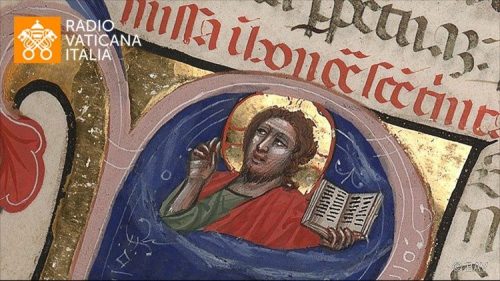READING OF THE DAY
A Reading from the Letter to the Hebrews
HEB 10:11-18
Every priest stands daily at his ministry,
offering frequently those same sacrifices
that can never take away sins.
But this one offered one sacrifice for sins,
and took his seat forever at the right hand of God;
now he waits until his enemies are made his footstool.
For by one offering he has made perfect forever
those who are being consecrated.
The Holy Spirit also testifies to us, for after saying:
This is the covenant I will establish with them
after those days, says the Lord:
“I will put my laws in their hearts,
and I will write them upon their minds,”
he also says:
Their sins and their evildoing
I will remember no more.
Where there is forgiveness of these, there is no longer offering for sin.
GOSPEL OF THE DAY
From the Gospel according to Mark
MK 4:1-20
On another occasion, Jesus began to teach by the sea.
A very large crowd gathered around him
so that he got into a boat on the sea and sat down.
And the whole crowd was beside the sea on land.
And he taught them at length in parables,
and in the course of his instruction he said to them,
“Hear this! A sower went out to sow.
And as he sowed, some seed fell on the path,
and the birds came and ate it up.
Other seed fell on rocky ground where it had little soil.
It sprang up at once because the soil was not deep.
And when the sun rose, it was scorched and it withered for lack of roots.
Some seed fell among thorns, and the thorns grew up and choked it
and it produced no grain.
And some seed fell on rich soil and produced fruit.
It came up and grew and yielded thirty, sixty, and a hundredfold.”
He added, “Whoever has ears to hear ought to hear.”
And when he was alone,
those present along with the Twelve
questioned him about the parables.
He answered them,
“The mystery of the Kingdom of God has been granted to you.
But to those outside everything comes in parables, so that
they may look and see but not perceive,
and hear and listen but not understand,
in order that they may not be converted and be forgiven.”
Jesus said to them, “Do you not understand this parable?
Then how will you understand any of the parables?
The sower sows the word.
These are the ones on the path where the word is sown.
As soon as they hear, Satan comes at once
and takes away the word sown in them.
And these are the ones sown on rocky ground who,
when they hear the word, receive it at once with joy.
But they have no roots; they last only for a time.
Then when tribulation or persecution comes because of the word,
they quickly fall away.
Those sown among thorns are another sort.
They are the people who hear the word,
but worldly anxiety, the lure of riches,
and the craving for other things intrude and choke the word,
and it bears no fruit.
But those sown on rich soil are the ones who hear the word and accept it
and bear fruit thirty and sixty and a hundredfold.”
WORDS OF THE HOLY FATHER
Dear Brothers and Sisters, Good morning!
When Jesus spoke, he used simple words and he also used images which were examples taken from daily life, in order to be easily understood by all. This is why they listened to him willingly and appreciated his message which directly touched their heart. And it was not that complicated language which was difficult to understand, as that used by the Doctors of the Law of that time, which was not easily understood, was very rigid and distanced people. And with this language Jesus made the mystery of the Kingdom of God understood; it was not complicated theology. And one example is that of today’s Gospel passage: the parable of the sower (cf. Mt 13:1-23).
The sower is Jesus. With this image, we can see that he presents himself as one who does not impose himself, but rather offers himself. He does not attract us by conquering us, but by donating himself: he casts seeds. With patience and generosity, he spreads his Word, which is not a cage or a trap, but a seed which can bear fruit. And how can it bear fruit? If we welcome it.
Therefore, the parable concerns us especially. In fact, it speaks more of the soil than of the sower. Jesus carries out, so to speak, a “spiritual X-ray” of our heart, which is the soil on which the seed of the Word falls. Our heart, like the soil, may be good and then the Word bears fruit — and a great deal — but it can also be hard and impermeable. This happens when we hear the Word but it bounces off of us, just as on a street: it does not enter.
Between the good soil and the street; the asphalt — if we throw a seed on the “sanpietrini” (cobblestones), nothing grows — there are however, two intermediate types of soil which, in different amounts, we can have within us. The first, Jesus says, is rocky. Let us try to imagine it: rocky ground is a terrain that “does not have much soil” (cf. Mt 13:5), so the seed sprouts but is unable to put down deep roots. This is how the superficial heart is: it welcomes the Lord, wants to pray, love and bear witness, but does not persevere; it becomes tired and never “takes off”. It is a heart without depth, where the rocks of laziness prevail over the good soil, where love is fickle and fleeting. But whoever welcomes the Lord only when they want to does not bear fruit.
Then, there is the last ground, the thorny one, filled with briars which choke the good plants. What do these thorns represent? “The cares of the world and the delight in riches” (v. 22), as Jesus says explicitly. The thorns are the vices which come to blows with God, which choke his presence: above all these are the idols of worldly wealth, living avidly, for oneself, for possessions and for power. If we cultivate these thorns, we choke God’s growth within us. Each of us can recognize his or her big or small thorns, the vices that inhabit the heart, those more or less deeply rooted briars that God does not like and that prevent us from having a clean heart. It is necessary to tear them out, otherwise the Word cannot bear fruit, the seed will not grow.
Dear brothers and sisters, Jesus invites us today to look inside ourselves: to give thanks for our good soil and to tend the soil that is not yet good. Let us ask ourselves if our heart is open to welcome the seed of the Word of God with faith. Let us ask ourselves if our rocks of laziness are still numerous and large; let us identify our thorns of vice and call them by name. Let us find the courage to reclaim the soil, to effect a nice conversion of our heart, bringing to the Lord in Confession and in prayer our rocks and our thorns. In doing this, Jesus, the Good Sower will be glad to carry out an additional task: purify our hearts by removing the rocks and the thorns which choke his Word.
May the Mother of God, whom we remember today with the title of Blessed Virgin of Mount Carmel, unparalleled in welcoming the Word of God and putting it into practice (cf. Lk 8:21), help us to purify our hearts and welcome the Lord’s presence there.
(Angelus, 16 July 2017)

